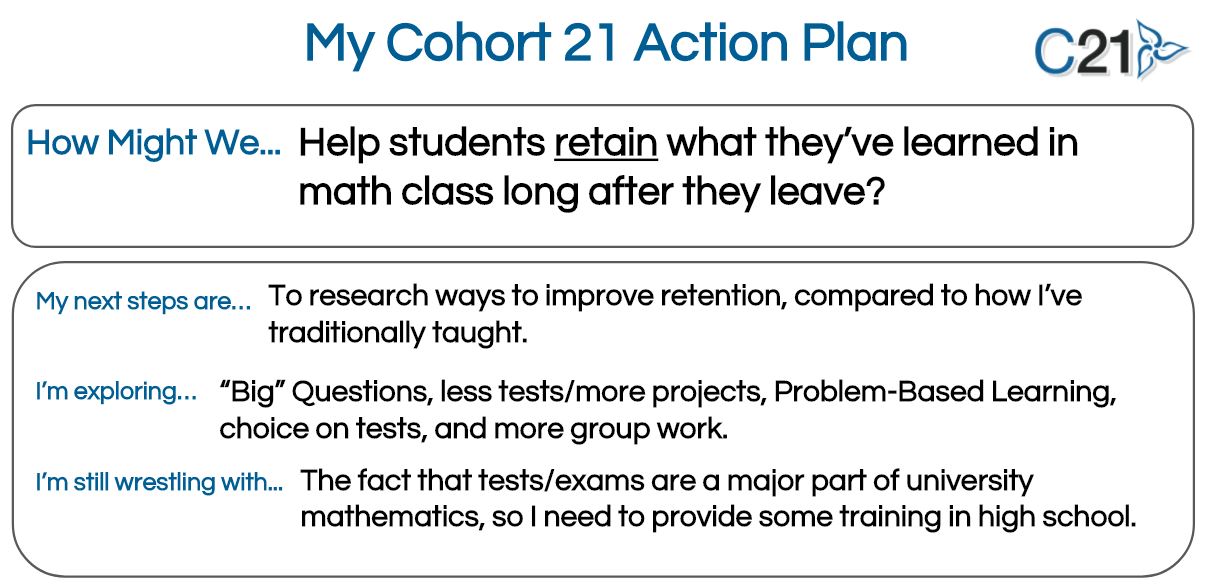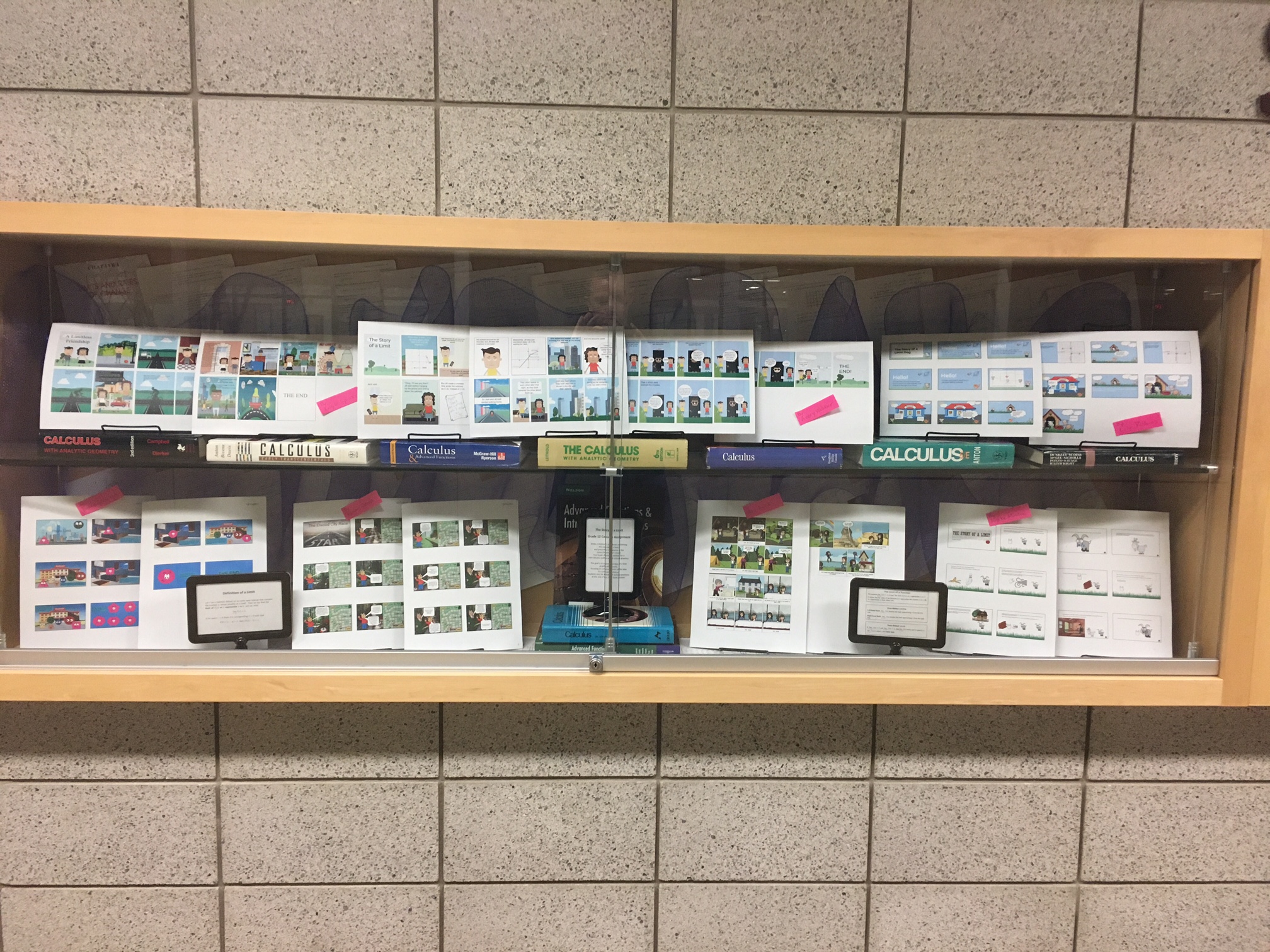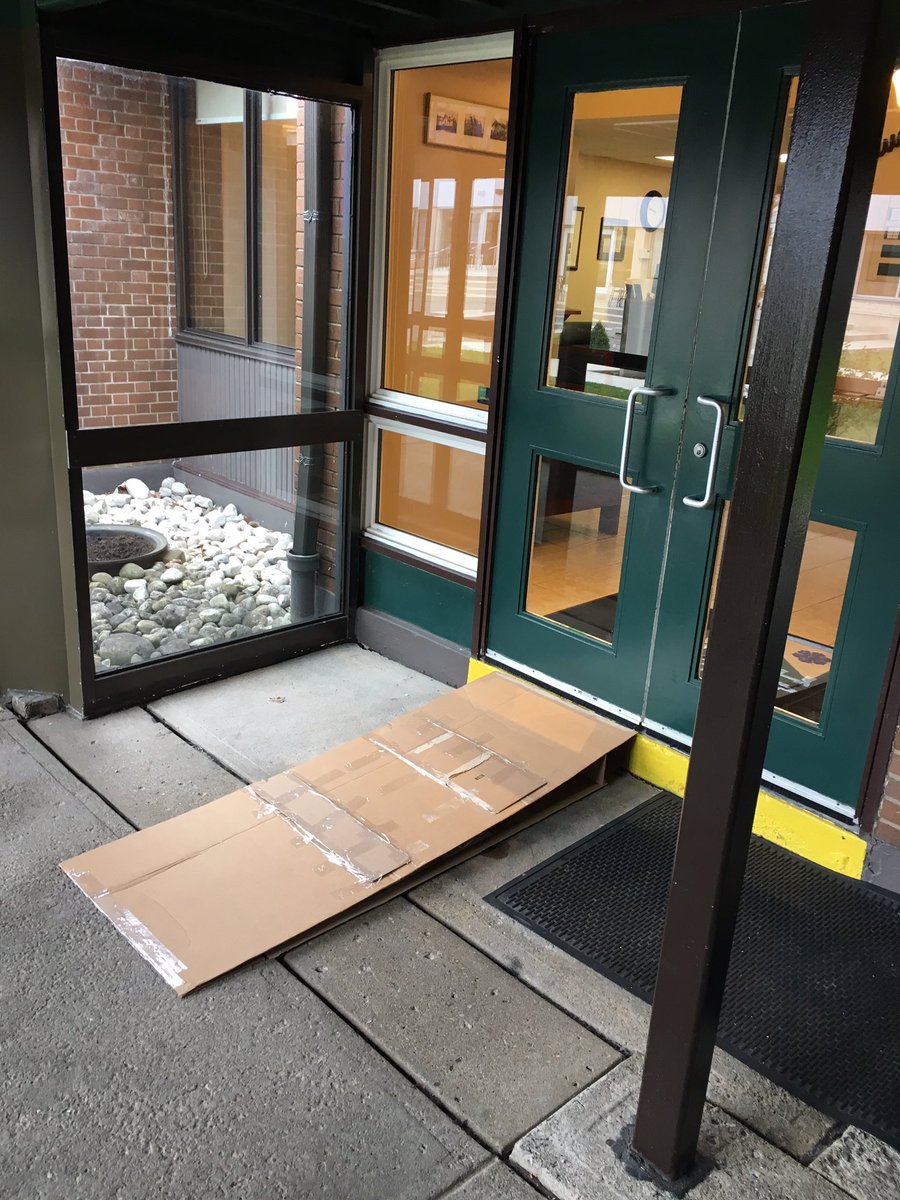Since our last F2F meeting, I’ve been wrestling with this idea of retention. Of course I want my students to retain what they’ve been taught, but I think I need to get more specific. Do I need my calculus students to have memorized the quotient rule, or am I satisfied if next year in university they are able to look up the formula and know how to use it? Do I expect my grade 10 students to walk into grade 11 math and remember every factoring rule, or am I happy if they have some recollection what’s happening and, with a little bit a practice, can get themselves right back up to speed? … Serious question – did these two examples just describe students who have had good retention of knowledge? I think I’m confused by my own action plan! What is good retention? Is it remembering how to use a learned skill immediately with no assistance? This isn’t how the real world works. Do we expect professional Engineers to remember everything from their 4th year classes? No, they would be able to read, research, and get assistance from colleagues to help solve the problem they are tasked with.
Although I haven’t exactly landed on my true focus, I have tried a few new things to this point and I’m curious to find out if they help with retention of knowledge.
In calculus this year, I assessed our first unit on limits and the definition of a derivative with a traditional assignment and test. Students haven’t seen these concepts since early November and I wonder how much they’ve retained. So, I plan on surprising them on their first day back in January with the assessment below (shhhh, don’t tell them). I’ll be sure to update this post once the data is collected.
Recently, I tried a more authentic form of assessment that I like to call The Smarties Project (please feel free to use it and/or pass it on to your colleagues). I’m hoping this way of learning about optimization will stick with my students longer. As part of this project, I tried grading it using the single point rubric, hoping that my students will engage more with the feedback I am providing. I’m planning on doing another “retention research assessment” about optimizing volume in a few months, afterwards I will compare if retention improved.
A few other non-traditional things I’ve tried this year are:
- “The Story of Limit” (thanks to @hpalmer for the idea!) – my calculus students wrote children’s stories that tried to explain the concept of a limit to children who are at least 7 years old. We then visited Junior and Montessori school classes where my students presented their stories. They are now on display outside our Senior Learning Commons (see picture below).
- PBL in grade 10 applied math – my students investigated how wheel chair friendly the older buildings on our campus are, measured current ramps on campus to see if they were below the legal angle (they were!), designed a legal wheel chair ramp for one of our school’s office buildings (see picture below), and lastly, presented their findings to our Head of College.
- In the New Year I’m hoping to teach vector addition with the help of billiards (thanks to @rutheichholtz for the idea!)
I honestly have no idea if these non-traditional ways of learning will improve a student’s retention of knowledge or not. Something I’ve been considering more recently is should I be focusing more on the skills required for good retention? Essentially, if a student has not retained a concept fully, what avenues can they take to help correct this?
If you can’t tell by now, I’m in desperate need of another F2F session! Hopefully my fellow Cohort 21ers can help straighten me out.
Lastly, here are some articles/blogs that have me reflecting on my current practice:
- How I Abolished Grading
- Applying Archaic Math Assessment Ideas To Other Skills/Activities
- Grades are for Onions, Beef, and Other Produce; Not Children
- Retrieval Practice: The Most Powerful Learning Strategy You’re Not Using
- Assessment Thoughts: A few past thoughts relevant for today?
- A venture capitalist searches for the purpose of school. Here’s what he found.
(Retention image courtesy of zacjohnson.com)





Another great blog post! Thanks for sharing – especially the single point rubric article, that’s a great resource for the many people trying to abolish student’s obsession with grades (@dtaylor).
I like what you said about how people work in the real world – we are not expected to retain and recall everything that we have ever learned. It sounds to me like the more important question is the one related to skills and resourcefulness. If you come across a situation and you don’t have the knowledge you need, what skills do you have to find out how to solve that problem? Looking up a rule and knowing how to apply it is more useful than memorizing a rule and not knowing why it’s important.
Whether they are retaining knowledge or skills, it seems like you’re on the right track with these project-based assignments. If I think back to my own education, the things I remember most are the projects or activities where I actually had to solve a real problem or create something to teach other people about the problem. Have you used the design process as a framework at all for these projects?
Looking forward to seeing you soon!
Les
This is the question we all should be asking ourselves everyday! I think you have done a great job so far researching and diving into new activities. It is inspiring! I am interested to hear if there was any retention from November 🙂
Michael, I completely identified with your struggle at the beginning of this post! It seems like every time I embark on achieving goals or exploring these HMW questions I think I know which way I am going and then suddenly realize I am wrestling with semantics and the basis of my own questions! Thankfully, delving further into this has always been fruitful. Actually defining what you mean by retention is important for your exploration but it is also a big philosophical question – what exactly is it important that students retain? how to find the information later? just needing a refresh to remember how to do something?
Apparently I retained nothing from my high school calculus classes and should probably read your students’ books on limits!
Creating those books involved explaining something to someone else while creating ramps was an application of knowledge. While both sound engaging, I’m curious to know which types of activities lead to greater retention (however you define it)…
Thanks for sharing your thought process and links. I’m looking forward to seeing what you discover!
Hi Michael,
Thanks for this post – as a chemistry teacher, the idea of what information is important to memorize really resonates with me. I hear stories about students being required to memorize the first 20 elements on the periodic table – IMO this is a HUGE waste of time! That being said, I warn students that having a periodic table is not the same as knowing how to use it; this is a SKILL that needs to be PRACTICED. You should know what information is available and where to look for it.
I think that your second example – being able to get back up to speed with practice – is most realistic to how the world works. To that end, when you gave your Retention Research quiz did you let students look at their notes for a quick refresher before they began? How much of a difference might that have made in their results?
On a related note, I have been working on a research project using an online platform to have students practice chemical nomenclature in grade 10 science. We are measuring student fluency using a “skill score” metric, which is a combination of accuracy and the time it takes them to answer. Last year we found that retention of this skill 1 month after the unit was over (similar to your Retention Research quiz) was directly correlated with the amount of practice a student had done during the unit. We’re in the middle of another session right now where we are providing feedback to half of the students during practice to see how it impacts their retention. What factors do you see as impacting students’ retention of knowledge and/or skills?
Thanks so much for sharing!
@lmiller @rutheichholtz I want to loop you in on this conversation as I know you have a ton of value and perspective to add having taught the same subject as @mmoore for so long.
This is powerful stuff, @mmoore. I’m glad to see you are trying out so many interesting ideas. How are the students responding? I suspect that whatever we can do to increase understanding of concepts will also increase retention. You may find that certain types of learning (explanation vs. application vs. investigation, etc., as @ljensen mentioned above) lend themselves better to understanding of specific topics. So perhaps gradients are best understood through application, whereas something abstract like limits is better understood through explaining the concept to others.
At any rate, I’m pretty sure that your students are engaged in their learning and that engagement leads to more understanding (and hopefully, retention!) I look forward to hearing more about your work this year.